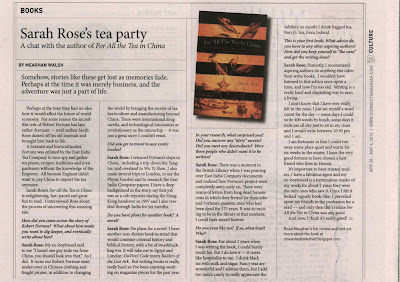My interview with Sarah Rose, author of FOR ALL THE TEA IN CHINA appears in this week’s Connect Savannah.
Many thanks to Sarah Rose for her willingness to speak with me, and to editor Jim Morekis for including this and many articles on books and literature in his publication. And thanks to all those at Viking Press, especially Meghan and Holly, for making sure I got to read and review this book.
Included is a transcript below:
Somehow, stories like these get lost as memories fade. Perhaps at the time it was merely business and the adventure was just a part of life. Perhaps at the time they had no idea how it would affect the future of world economy. For some reason the incredible trek of Robert Fortune has lain rather dormant — until author Sarah Rose dusted off his old journals and brought him back to like. A botanist and horticulturalist, Fortune was enlisted by the East India Tea Company to turn spy and gather tea plants, recipes, traditions and even gardeners without the knowledge of the Emperor. All because England didn’t want to pay China to import the tea anymore. Her book is enlightening, fast-paced and great fun to read. I interviewed Sarah Rose about the process of uncovering this amazing tale:
Q: How did you come across the story of Robert Fortune? What about him made you want to dig deeper, and eventually write about him?
A: My ex-boyfriend said to me “I heard one guy stole tea from China, you should look into that.” So I did. It turns out Robert Fortune went undercover in Chinese clothing and fought pirates, in addition to changing the world by bringing the secrets of tea horticulture and manufacturing beyond China. There were international drug cartels, and technological innovation as revolutionary as the microchip – it was just a great story I couldn’t resist.
Q: Did you get to travel to any exotic locales?
A: I retraced Fortune’s steps in China, including a trip down the Yangtze, and overland to Wu Yi Shan. I also made several trips to London, to see the Physic Garden and to research the East India Company papers. I have a deep background in the story, my first job was as a cub reporter during the Hong Kong handover in 1997 and I also traveled through India for six months.
Q: Do you have plans for another book? A novel?
A: No plans for a novel. I have another non-fiction book in mind that would combine colonial history and biblical history, with a bit of swashbuckling too. It will take me to Egypt and London: DaVinci Code meets Raiders of the Lost Ark. But writing books is really, really hard so I’ve been enjoying working on magazine pieces for the past year.
Q: In your research, what surprised you? Did you uncover any “dirty” secrets? Did you meet any descendants? Were there people who didn’t want it to be written about?
A: There was a moment in the British Library when I was pouring over East India Company documents and realized how Fortune’s project went completely awry early on. There were reams of letters from long dead bureaucrats in which they fretted for their jobs and Fortune’s mission, men who had been dead for 125 years. It was so exciting to be in the library at that moment, I could have stayed forever.
Q: Do you even like tea? If so, what kind? Why?
A: For about 2 years when I was writing the book, I could barely touch tea But I do love it – it tastes like hospitality to me. I drink black tea with milk and sugar. Fancy teas are wonderful and I admire them, but I add to much candy to really appreciate the subtlety, so mostly I drink bagged, Barry’s Tea, from Ireland.
Q: This is your first book. What advice do you have to any other aspiring authors? How did you keep yourself in “the zone” and get the writing done?
A: Honestly, I recommend aspiring authors do anything else other than write books. I wouldn’t have listened to this advice once upon a time, and now I’m too old. Writing is a really hard and dispiriting way to earn a living.
I think Richard Ford (who was my professor) gave great advice in the Guardian: http://www.guardian.co.uk/
I don’t know that I have ever really felt in the zone, I just set myself a word count for the day – some days I could write 400 words by lunch, some days it took me all day just to sit in my chair and I would write between 10:30 pm and 1 am.
I am fortunate in that I could run away some place quiet and warm for six weeks in the winter. I have the very good fortune to have chosen a best friend who lives in Hawaii.
It’s important to have trusted readers. I have a fabulous agent and my ex-boyfriend is a tremendous reader of my work; for about 2 years they were the only ones who saw it. Once I felt it looked vaguely book-like, I prevailed upon my friends in the profession for a read — and only *then* did I realize For All the Tea in China was any good.
And now, I think it’s really good.

